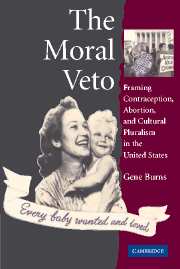Book contents
- Frontmatter
- Contents
- Acknowledgments
- 1 Introduction
- 2 Framing Contraception within Moral Worldviews: The Early, Radical Birth Control Movement
- 3 The Mainstreaming of Birth Control: A New Alliance with Eugenics and Medicine
- Dennett's Moral Worldview and the Catholic Moral Veto: Unsuccessful Frames for Contraception
- 5 Abortion before Controversy: Quiet Reform within a Medical, Humanitarian Frame
- 6 Abortion and Legislative Stalemate: The Weakness and Strength of the Medical, Humanitarian Frame
- 7 Looking Back: Limiting Frames, Moral Vetoes, and Cultural Pluralism
- Works Cited
- Index
7 - Looking Back: Limiting Frames, Moral Vetoes, and Cultural Pluralism
Published online by Cambridge University Press: 21 July 2009
- Frontmatter
- Contents
- Acknowledgments
- 1 Introduction
- 2 Framing Contraception within Moral Worldviews: The Early, Radical Birth Control Movement
- 3 The Mainstreaming of Birth Control: A New Alliance with Eugenics and Medicine
- Dennett's Moral Worldview and the Catholic Moral Veto: Unsuccessful Frames for Contraception
- 5 Abortion before Controversy: Quiet Reform within a Medical, Humanitarian Frame
- 6 Abortion and Legislative Stalemate: The Weakness and Strength of the Medical, Humanitarian Frame
- 7 Looking Back: Limiting Frames, Moral Vetoes, and Cultural Pluralism
- Works Cited
- Index
Summary
Introduction
In the opening chapter, I used the metaphor of a conversation to describe the political and social dynamics of reproductive politics in the twentieth-century United States. In this final chapter, I want to explore that metaphor further, in order to draw out the theoretical implications. For most of the book so far, I have attempted to present the discussion in a way that is accessible to a variety of readers. That should be true of much of this final chapter as well, especially the beginning of the chapter. But, as the chapter proceeds, it will address more explicitly important theoretical debates within sociology, because those debates have a great deal to tell us about the history of American reproductive politics. Sociology's theoretical debates are ideally always strongly linked to empirical understanding, and so even the theoretical discussion will make continual reference back to that history.
Let me begin by saying a little more about the conversation metaphor. First, I should qualify its use: I mean “conversation” indeed as a metaphor, to indicate any time that people are involved in debate or discussion of a social issue. I do not mean to say literally that their “conversation,” that is, their actual speaking to each other, is the only aspect worth examining. Indeed, by saying that people are engaged in a conversation, I mean they are sociologically and politically engaged: I mean there are groups of people who identify the issue as relevant to them and think the issue is a worthwhile political concern.
- Type
- Chapter
- Information
- The Moral VetoFraming Contraception, Abortion, and Cultural Pluralism in the United States, pp. 244 - 314Publisher: Cambridge University PressPrint publication year: 2005



